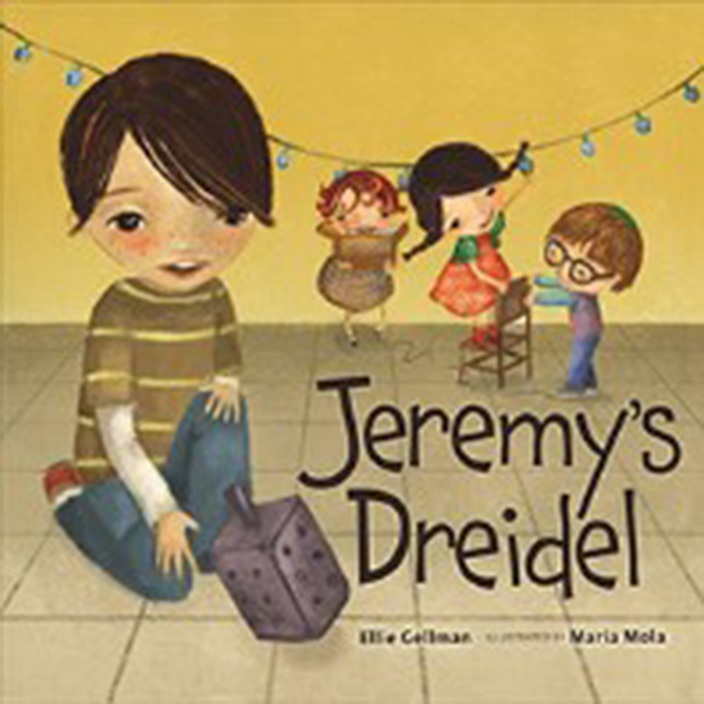Title: Jeremy’s Dreidel
Author: Ellie Gellman
Illustrator: Maria Mola
Publisher: Kar-Ben
Intended for Ages: 7-8 years
Jewish Customs: Hanukkah, playing dreidel, , and the commandment not to “put a stumbling block before the blind”
Additional Topics Mentioned: People with disabilities, being considerate of other people's feelings
Synopsis
At a -making workshop, Jeremy’s friends think that he is molding a secret code on his clay dreidel. However, they soon find out that he is really making a special gift: a dreidel with Braille letters on it for his father, who is blind. How will he get his friends to appreciate his special dreidel?
Highlights
- This story shows us that people with disabilities can do many of the same things as people without disabilities- they just may do them differently. After Jeremy patiently describes how his father, who is blind, gets along in the world, he declares: “Blind isn’t how you look, it’s how you see.” This is a great lesson: that having a disability isn’t about how a person appears, but rather about their need to do some things in a different way than people who don’t have that disability. Jeremy’s dad can do all of the things other dads do, but he has special tools and ways of doing them. For instance, even though he would not be able to see a dreidel on display, he could “see” it with his hands.
- This book explores the notion of being considerate of other people’s feelings. Jeremy doesn’t want to feel different from others in a negative way; he wants the others to know he has a dad who is as capable as the other dads. Kids want to fit in and want their parents to be respected and admired. Therefore, while it is good to want to understand disabilities and the ways people adapt, there are better ways to learn than to make another person feel self-conscious.
- This book reminds us that not everything is a competition. When the children learn that the workshop teacher decided to feature her favorite dreidels by displaying them behind glass on a special shelf, Jeremy is devastated. His father won’t be able to hold the dreidel, let alone play with it. One friend responds, “Jeremy is right. Why do we need our dreidels in a showcase? Dreidels are meant to be played with!” A joyous, dreidel-filled Hanukkah party follows. This reminds us that we should appreciate the activity, not the promise of a prize.
- This story shows us how we can be flexible to include everyone. The children in the book persuade the workshop organizer to change how the winning dreidels are presented so that Jeremy’s father, who is blind, can ”see” his. This is a reminder that rules are wonderful for instilling structure and order, but that sometimes flexibility can be considered. If you and your children exercise the same level of flexibility, your community can become a place where people who do things differently can fully participate.
Jewish Topics for Family Discussion
- History and traditions related to celebrating Hanukkah. In the context of the workshop, the children learn about miracles, the Maccabees and how a dreidel’s letters are different in Israel versus the rest of the world. To broaden your conversation beyond the story, look in the back of the book for engaging activities! Two videos by Shalom Sesame offer other ways to enhance the holiday: One is a story of Hanukkah starring puppets; the other video features a boy who makes olive oil in order to light his family’s hanukkiyah (Hanukkah menorah). Additional Shalom Sesame videos teach about the Hanukkah traditions.
- B’tzelem Elohim, the idea that we are all made in God’s image. It is a Jewish belief that all human beings were created b’tzelem elohim, in God’s image. It doesn’t mean that human beings look like God, but rather that we have an inner likeness that is divine. All people are precious, unique and capable of bringing holiness and kindness into the world. Bearing this in mind, this book is a great springboard to start teaching children to be accepting of persons with disabilities. The Union for Reform Judaism's Disabilities Inclusion Learning Center has many great resources for you to draw from, including a special study session about creating an inclusive environment in early childhood centers.
- Inclusion and "not putting a stumbling block before the blind”: Judaism guides us to welcome and accommodate those with different needs. Jeremy’s friends learn that his father uses special devices to navigate through his days in which he goes to work, uses a special laptop and cell phone. They therefore realize that putting their dreidels in a glass case would be putting a stumbling block before him, as he would no longer be able to participate, and quickly find a way to include him in the festivities. You can watch this Shalom Sesame video about a playground for kids with disabilities to show your children another creative solution for people with special needs.
In addition to making physical adjustments, there are other ways that we can – and must – be inclusive. Rather than creating stumbling blocks by failing to understand what people with disabilities can do, and seeing them only within the context of their disabilities, it is incumbent upon us to learn about individuals’ specific abilities and to get to know them as friends, who are no different from us. Only then will we be able to overcome the stumbling blocks of misunderstanding and avoidance that are all too common in our encounters (or lack of encounters) with people with disabilities.
It may be difficult for a non-disabled person to understand why accommodations are necessary. Though Jeremy is willing to explain how his father succeeds in a seeing world, he eventually gets impatient with his friends’ lack of understanding. We can see that the family members of those with disabilities are also sensitive about and impacted by how others view their loves ones. For a deeper understanding, read "Growing Up with Parents with Disabilities" and "Forever Young: Living with a Child with Disabilities."
PJ Library® provides the gift of free Jewish books and music to families raising Jewish children between the ages of 6 months and 8 years. Jeremy's Dreidel has been one of the popular selections for the 7- to 8-year-old children who subscribe to PJ Library®. Enroll your child to be a part of this exciting program.



